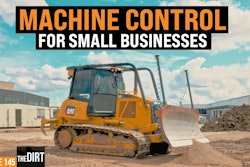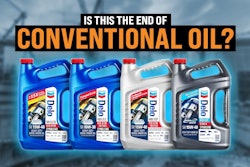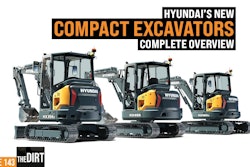JCB has brought its Pothole Pro to the U.S., a three-in-one machine that the company says can reduce pothole repairs to 8 minutes.
The special attachment system on the company’s Hydradig 110W wheeled excavator can cut, crop and clean – completing a pothole repair or patch job in a fraction of the time it takes traditional methods. The only thing it doesn’t do is lay the asphalt.
JCB product manager Javier Marin comes on The Dirt to give a closer look at the Pothole Pro, answering all your questions about how it works.
JCB rolled out the Pothole Pro in England in 2021 and has recently brought it to the U.S. for sale after being tested in municipalities in Pennsylvania. It says the machine can repair 299 cubic yards in a single shift and 6,540 cubic yards in a month, cutting costs in half. It is also designed to make those repairs permanent, not just quick fixes.
So to learn more about this unique pothole repair system, check out the latest episode of The Dirt.
Equipment World serves up weekly videos on the latest in construction equipment, work trucks and pickup trucks—everything contractors need to get their work done. Subscribe and visit us at equipmentworld.com!
In This Episode:
- 00:00 - The JCB Pothole Pro
- 00:41 - How Does the JCB Pothole Pro Work?
- 01:54 - What’s the Learning Curve for the Pothole Pro?
- 02:47 - Spray Patching vs. the Pothole Pro
- 03:22 - How Versatile is the Pothole Pro?
- 06:36 - How Fast Can the Pothole Pro Prepare a Work Area?
- 08:02 - Can the Pothole Pro Drive from Jobsite to Jobsite?
- 08:27 - What is the Wait Time to Receive a Pothole Pro?
- 09:01 - Final Thoughts
Bryan (00:00):
Today, we're here to talk about a pretty unique machine. We're here to talk about the JCB Pothole Pro. What is the Pothole Pro? It's an all-in-one machine that is made to basically prep for pothole repair. This thing comes in, it mills, it carves nice clean edges, and then it sweeps everything up into the bucket so you can dump it into a truck, and off you go down the road to the next pothole to be repaired. So without further ado, here's Javier from JCB to tell us more about the Pothole Pro.
(00:41):
What is the Pothole Pro? For a lot of people, they've probably never seen anything like this, they're not really familiar with what the machine is. Can you give us just a general overview of the machine?
Javier Marin (00:51):
Okay. So, the Pothole Pro is a three in one solution to pothole repair. Basically, the way we say it is it can cut, crop and clean with one machine. So essentially, on the back of the Pothole Pro, you have a two foot planer. So, as you're working through, you can just come into your pothole, you can plan it through. It sits on a carriage that moves from side to side. So, if it's wider than two feet, obviously you can just ship from side to side. Once you've milled your hole, then you can come in with our 16 inch cropper and actually cut your straight lines anywhere where you need to line it all up. And after that's done, you come back with your sweeper, which is four foot wide, and just sweep it all up into a half cubic yard hopper that's attached to it. One important thing to add is both the planar and the sweeper are water suppressed to help with dust.
Bryan (01:34):
Interesting. So, you're covering the full gamut of prep to do the actual pothole repair with this one machine?
Javier (01:43):
Absolutely. The only thing we do not do is lay down asphalt. That's the only thing... We haven't done it yet. We will get there.
Bryan (01:49):
Coming soon. Excellent. So, I guess my next question is, at least here in the US because we have such a unique market when it comes to this stuff, I'm envisioning most of these machines probably ending up in the hands of municipalities. And so, one of the first questions I would think they would have is, what is the learning curve on this machine? How quick can I get an operator up to speed? Because you've got multiple attachments running off of one machine. That seems pretty complicated.
Javier (02:16):
You're absolutely right. And see, that's the thing. This isn't necessarily a very simple machine, but it's not a very complicated machine either. You steer with the steering wheel just like you would any conventional car, and you have your excavator controls. Obviously, in the excavator controls, you have all your auxiliary buttons to operate all the attachments. So essentially, all you really have to do is learn your buttons and you'll get there. And we've got these out with people, and one week, two weeks they're into it. Obviously it's a learning curve. It's not easy. But yeah, anybody can learn this stuff.
Bryan (02:46):
And just out of curiosity, there are a lot of municipalities that pursue pothole repair with like spray patch machines and things of that nature. Can you give us just a quick reason why would a municipality want to pursue this level of pothole repair versus a traditional spray patch repair?
Javier (03:01):
So, what it is this is more of a permanent repair, because you have such a perfect cut and the right depth all the way across, you get a better repair overall. So, it won't come back anytime soon. We just considered this more of a permanent repair instead of just a quick patch.
Bryan (03:16):
Yeah. It's not a Band-Aid fix. You're actually redoing that little section of pavement.
Javier (03:21):
Absolutely.
Bryan (03:21):
So, my next question is, again, thinking from the terms of a municipality that might be interested in this machine, how versatile is this machine? It looks at the surface like you've got some sort of a tilt rotator on it. Is it possible to drop that attachment and use it as a traditional wheeled excavator, or is this thing pretty well set up to be the pothole machine?
Javier (05:07):
No, it's very versatile. As a matter of fact, one of the sayings I have is how do you spell versatility? And it's P-O-T-H-O-L-E P-R-O, Pothole Pro. So, I was actually out in Pennsylvania yesterday, and we were demoing this unit to a couple municipalities. And we started off doing a pothole repair, and we ended the day mowing and sweeping with the same machine. So yes, it comes out as a Pothole Pro package, but that's not its limits. You can obviously put a snowblower if you're up north, you can do a mower, you can do a shear. Anything that's within the gallons per minute capability of the machine, you can use on it. So, you're not limited to just pothole repair.
Bryan (05:56):
I do really like the way that you guys have approached that because I do feel like when you start moving into these specialized machines, there's a lot of companies that get so focused down on what they've created that they lose the bigger picture of... A lot of contractors and municipalities have a hard time paying this much money for a it only does one thing sort of machine. They need that versatility to justify that cost. So, I'm really happy to hear that you can drop that attachment and you can still use it as a traditional wheeled excavator.
Javier (06:26):
You're absolutely right, because we realize that certain times of the year, maybe you're not doing any pothole repair. So, like I said, up north, you need to put that blower on there, and then use it for snow blowing.
Bryan (06:36):
One of the things that you guys advertise, as I was looking through some of the materials you sent over, you're able to basically prep a pothole within, and if I remember right, it was about eight minutes. Is that correct?
Javier (06:47):
Absolutely. Absolutely. The pothole prep that we did yesterday was about, it was like a four by six area. The only thing is we were training the municipalities, so it took us 15 minutes, but that's with instruction in what we were doing.
Bryan (07:01):
I was about to say that's with instruction showing an operator how the process works, and you were still able to accomplish that in 15 minutes.
Javier (07:08):
Correct.
Bryan (07:09):
And you are fully prepped for the asphalt, guys.
Javier (07:12):
Yeah, fully prepped. Absolutely. And the one thing I will say is during this prep, it was one individual only, one individual did the whole prep in 15 minutes while giving instruction as well.
Bryan (07:24):
Wow. And I will say the other advantage that comes to mind is in our industry where you can't find anyone and it's getting increasingly difficult to find skilled operators, one of the chief complaints of the operators is, I don't want to be outside in the elements. I don't want to be doing this backbreaking laborous work. And this machine has really taken that out of the picture because I think about a traditional crew. You've got someone that's coming in with a skid steer with a planer on it, and then you've got someone coming in with a broom to follow up, but then you've still got handwork that's got to take place. You're getting in and out of cabs and in and out of machines.
Javier (07:55):
Correct.
Bryan (07:55):
This is one machine, one operator that is just cruising around the city doing pothole repairs and he never has to leave a seat.
Javier (08:01):
Yes, sir. And that's absolutely right. Cruising around the town is another big benefit of this machine. It has a top speed of 25 miles per hour, so there's no need to truck it out there. You just drive it to your location and you're set. We actually did that earlier in this week in another township in Pennsylvania where we actually drove it out to site. So, there's no need for an additional truck to tow it around in. It's its own machine that can get itself anywhere it needs to go and do what it needs to do.
Bryan (08:27):
Well, my final question for you is what does your availability look like on these machines here in the US currently?
Javier (08:32):
Right now, we're at about three to four month wait time on them.
Bryan (08:34):
Okay. So, really not that bad in the grand scheme of things?
Javier (08:37):
No, not that bad. And there's just a couple available in the United States at the dealers right now too.
Bryan (08:40):
Perfect.
Javier (08:41):
They're using them for demos, but if anybody needed one right now, they could probably get one ASAP.
Bryan (08:45):
Excellent. And who would you recommend contacting, your local JCB dealer, or is there someone specific someone should talk to about this machine?
Javier (08:51):
No, just contact your local JCB dealer, and they'll be able to help you out.
Bryan (08:55):
Awesome. Well, Javier, thank you so much for being on the show and all the information.
Javier (08:59):
Thank you, Bryan. Thank you for having me.
Bryan (09:00):
Well, thank you again for JCB and Javier coming on the show to discuss the Pothole Pro with us today. If you guys are interested, like Javier said, just reach out to your local JCB dealer, and they can get you all the details you need. As always, I hope this helps you in your business. And we'll catch you guys next time on The Dirt.









